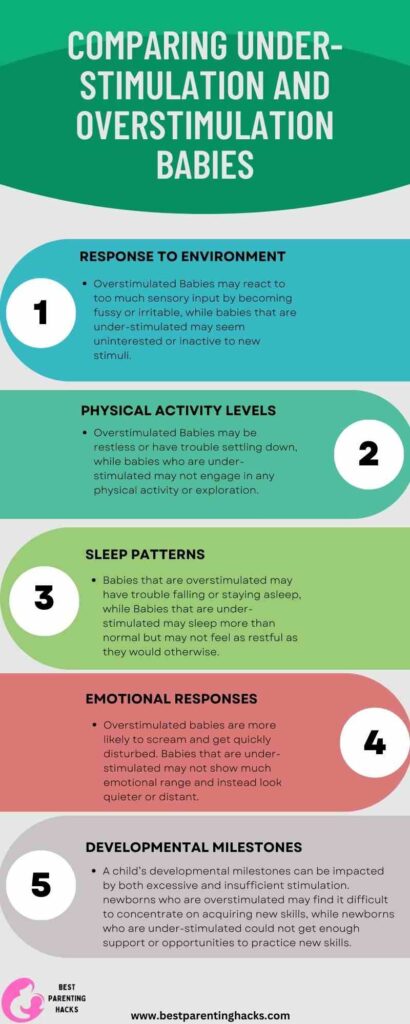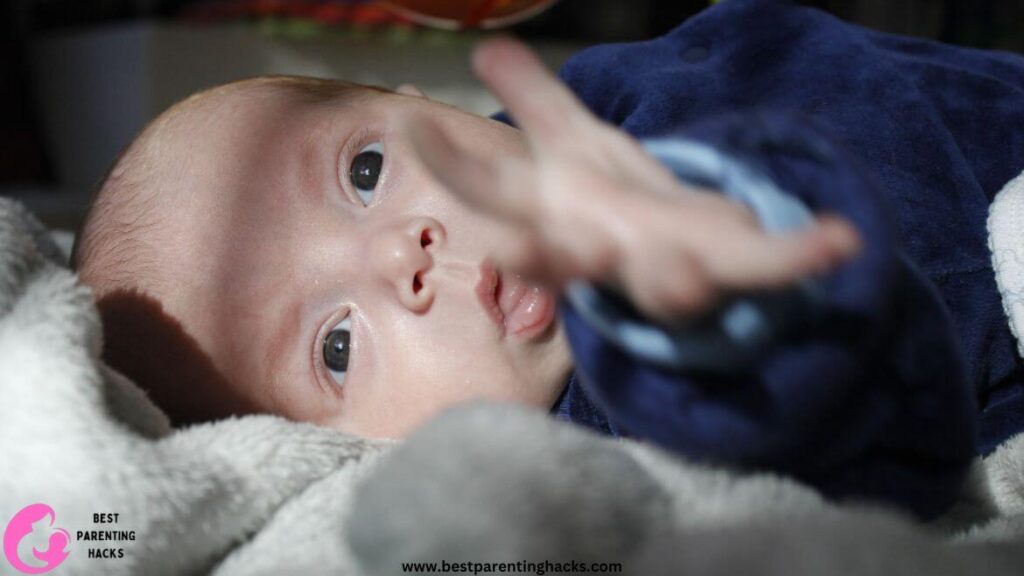Table of Contents
I’ve learned to appreciate the vital function stimulation plays in developing a child as someone who has successfully navigated the challenging world of parenting. It’s a delicate balancing act that calls for close observation and a thorough comprehension of your infant’s demands. Not only does stimulation keep your kid occupied, but it also supports mental and physical development, emotional growth, and healthy brain development.
When a baby is young, their environment shapes their worldview. But what happens if the baby doesn’t get enough stimulation? This is an important question for new parents to think about because understimulation can have just as much of an impact as overstimulation, but it’s often overlooked. In this post, we’ll explore the symptoms of under-stimulated babies, compare them to overstimulation, and provide helpful advice on how to make sure your child’s environment is stimulating and well-balanced.

Recognizing Signs of Under-stimulation in Babies: A Natural Phenomenon
Examining a baby’s normal growth is necessary to comprehend under stimulation in infants. Babies have a natural curiosity that drives them to investigate and comprehend the world around them. Insufficient stimulation of this interest can result in under-stimulation, which is a condition in which a baby’s demands for development are not entirely satisfied.
1. Reduced Responsiveness: A pronounced loss of responsiveness is one of the initial indicators of under-stimulation. A newborn who is not stimulated enough may not respond to unfamiliar faces or noises in their surroundings, displaying apathy rather than interest.
2. Physical Inactivity: A newborn learns about the world through movement. Your baby may need additional stimulation if they don’t seem interested in reaching out, crouching, or engaging in other physical activities.
3. Limited Vocalization: Babbling and noises are how babies express themselves. A newborn may not be aroused enough to take part in these natural kinds of communication if there is a lack of vocal explorations.
4. Lack of interest in Play: Play is an essential way to learn. A baby who is not stimulated enough may not be interested in play, games, or interactive activities, which can lead to missed opportunities for bonding and learning.

Comparing Under-stimulation and Overstimulation
It is essential to distinguish between overstimulation and under stimulation to provide a healthy environment for your baby’s growth. Here are five things to think about:
1. Response to Environment: Overstimulated Babies may react to too much sensory input by becoming fussy or irritable, while babies that are under-stimulated may seem uninterested or inactive to new stimuli.
2. Physical Activity Levels: Overstimulated Babies may be restless or have trouble settling down, while babies who are under-stimulated may not engage in any physical activity or exploration.
3. Sleep Patterns: Babies that are overstimulated may have trouble falling or staying asleep, while Babies that are under-stimulated may sleep more than normal but may not feel as restful as they would otherwise.
4. Emotional Responses: Overstimulated babies are more likely to scream and get quickly disturbed. Babies that are under-stimulated may not show much emotional range and instead look quieter or distant.
5. Developmental Milestones: A child’s developmental milestones can be impacted by both excessive and insufficient stimulation. newborns who are overstimulated may find it difficult to concentrate on acquiring new skills, while newborns who are under-stimulated could not get enough support or opportunities to practice new skills.
You Might Also Like to Read: Should I Wake My Sick Baby to Eat?

Stimulating Your Baby: Tips and Tricks
Giving your infant a range of activities that appeal to their senses, advance physical development, and foster emotional attachment is the key to stimulating them. Here are five strategies for introducing your infant to stimulation:
1. Engage in Interactive Play: Playtime serves as a teaching tool in addition to being enjoyable. Play interactive activities such as sound-imitating, light tickling, and peek-a-boo. This increases the link between you and your kid while also stimulating them.
2. Introduce a Variety of Textures: Using toys, books, and commonplace things, let your infant discover a range of textures, including smooth, rough, soft, and hard. The development of their touch senses depends on this sensory play.
3. Encourage Movement: Toys should be placed just out of your baby’s reach to encourage them to reach and extend. Encourage hobbies including crawling and walking as they become bigger.
4. Sing and Talk to Your Baby: Long before a newborn utters their first word, language development begins. Sing songs, tell your baby stories, and engage in conversation with them throughout the day. This exchange of words is a potent stimulant.
5. Offer Visual Stimulation: To excite your baby’s visual senses, give them bright toys, mobiles, and books with high-contrast graphics. Make sure, nevertheless, that there isn’t too much visual stimulation.
You Might Also Like to Read: 5 Ways to Make the Bassinet More Comfortable for a Baby

When to Seek Professional Advice
Although it’s common for newborns to exhibit different degrees of activity and alertness, some indications may call for medical attention. See a pediatrician if you observe ongoing indicators of under-stimulation, such as delayed developmental milestones, restricted physical mobility, or lack of responsiveness to stimuli. They can determine whether your baby’s conduct is typical or whether assistance is required. To address problems with development or other underlying concerns, early intervention may be essential.
Conclusion
In conclusion, a critical component of parenting is being aware of and sensitive to your baby’s demands for stimulation. It all comes down to reading your baby’s signs, offering a range of engaging experiences, and recognizing when to get help from a professional. Keep in mind that each infant is different, so what suits one might not suit another. The secret is to approach your baby’s growth with proactive, reactive, and attentive care.

FAQs
1. In what ways may my infant be under-stimulated? Keep an eye out for symptoms such as diminished physical activity, restricted vocalization, and lack of interest in the environment.
2. What easy methods can I engage my kid in stimulation? Your infant can be stimulated by regular involvement, new sensations, and interactive play.
3. Can my baby’s growth be impacted by under-stimulation? Yes, it may affect their learning and interest. However, they may catch up fast if given the correct stimuli.
4. How can I give my infant the right amount of stimulation and rest? Observe the indications that your baby gives you. When they’re feeling worn out or overburdened, they’ll let you know.
5. What should I do if I think my infant is getting too much stimulation? See a pediatrician for individualized guidance and comfort.
6. Is excessive stimulation harmful? Yes, fussiness and restlessness can result from overstimulation. The key is to strike a balance.
7. How frequently should I give my infant exciting tasks to do? While consistent interaction is important, make sure your infant gets adequate sleep and downtime.




